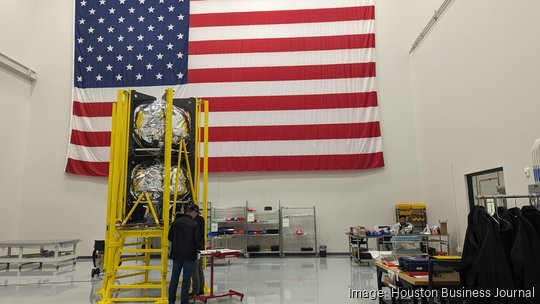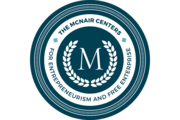
A Houston company that made history this year continues to draw recognition, but the wheels are already moving on an encore.
Intuitive Machines (Nasdaq: LUNR) was the only Houston-headquartered company to be selected for the 2024 Time 100 Most Influential Companies list released on May 30. The company was selected in Time’s “Pioneers” category.
The nomination is just the latest accolade for Intuitive Machines, which completed the first commercial moon landing and first U.S. moon landing since the 1970s in February. Although its lunar lander, Odysseus, toppled over on touchdown, the craft was still able to transmit data, and the mission was deemed a success by Intuitive Machines co-founder and CEO Stephen Altemus.
“The standout accomplishment in the first quarter was Intuitive Machines' first successful lunar mission which fundamentally disrupted the economics of landing on the moon and broke economic and technological barriers to enable this new burgeoning lunar economy,” Altemus said in a Q1 2024 earnings call in May.
The landing, also known as IM-1, pushed Intuitive Machines’ Q1 revenue to $73.1 million, a jump of over 300% year over year. According to the company’s recently promoted CFO Steven Vontur, the primary driver of revenue besides the landing was a $719 million, five-year contract awarded by NASA to Space & Technology Solutions, a joint venture between Intuitive Machines and Houston-based KBR Inc. (NYSE: KBR). The company went public in February of last year.
Next on the radar is another moon mission later in 2024, which would make Intuitive Machines the first company to land on the moon twice in a year. The company is also discussing a 2025 launch date with NASA for IM-3, its third moon mission.
Vontur also said a new timeline for the NASA Commercial Lunar Payload Services, or CLPS, program’s next installment — which funded IM-1 — would allow Intuitive Machines to launch its first fully commercial mission after IM-3. All the company’s current missions carry a mix of NASA and and private company payloads.
The IM-2 lander was christened Athena, or “Attie,” this week, Intuitive Machines said in a LinkedIn post. Like Odysseus, Athena will be built at the company’s $40 million Lunar Production and Operations Center at the Houston Spaceport. The manufacturing facility, which includes space to test engines and to 3D-print components, opened last September.
New international space race could be won in Houston
In response to analyst questions on the Q1 earnings call, Altemus and Vontur highlighted that though IM-1’s success was historic, it was not unique, pointing to the Chinese Chang’e 6 mission, which launched at the beginning of May to bring samples back from the moon.
“The steady drumbeat of China's success demonstrates the strategic importance of the moon and we hope is a call to action for the U.S. government and the public of what Intuitive Machines is building and the importance of stable funding and commercial utilization,” Altemus said.
Vontur said the CLPS program had “sparked” the domestic space economy to make moon missions cheaper and that it was possible for domestic companies to catch up quickly. Texas has been making moves to secure its leadership role in the space race.
In the Lone Star State, over $300 million in funding has been earmarked to boost Texas’ space economy to compete not just with other U.S. states but internationally. In addition to the funding, Texas space business leaders and academics were named to the newly created Texas Space Commission.
Jack “2fish” Fisher, vice president of production and operations at Intuitive Machines, was one of the leaders chosen for the commission. Fisher told the Houston Business Journal that more shared infrastructure, like Texas A&M’s $200 million Space Institute, was one of the priorities he was keeping an eye on as the commission develops its strategic plan.
“[The Space Institute] does this magic of shared infrastructure, the really expensive stuff that you don't want to pay for. I do not want to pay for a football-field-sized Mars simulator — but I sure do want to use it,” Fisher said.
Sign up here for the Houston Business Journal’s free morning and afternoon daily newsletters to receive the latest business news impacting greater Houston. For more business intelligence, follow us on LinkedIn, Facebook, X (formerly known as Twitter) and Instagram.





